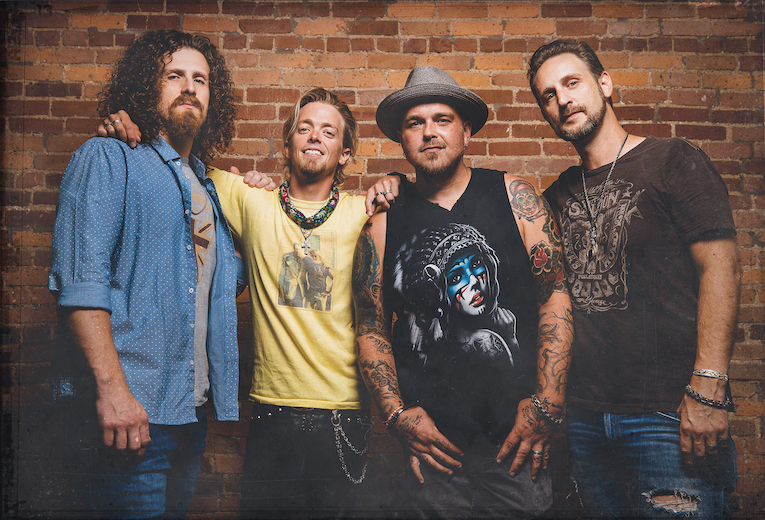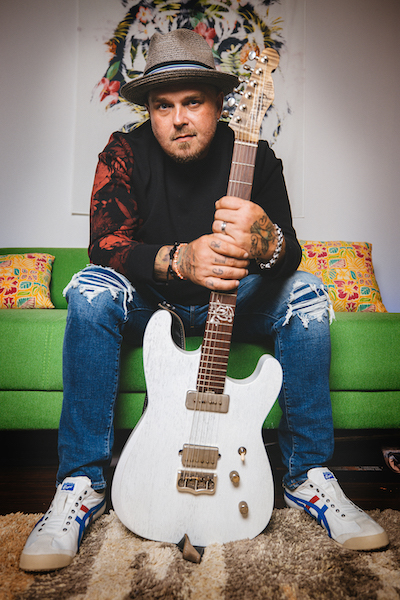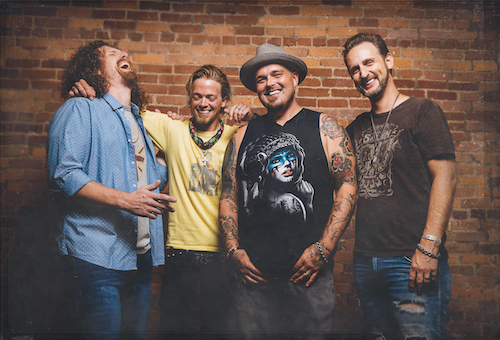
Photo: Chris Robertson, Black Stone Cherry by Mike Rodway
By Martine Ehrenclou
Over the past two decades, Black Stone Cherry has set a new standard for Southern Rock/Rock N’ Roll, revitalizing the tradition of muscular riffs, stirring rock hooks and scorching, soulful vocals. Since their formation in 2001, the four-piece brotherhood has remained Chris Robertson (lead vocals/guitar), Ben Wells (guitar/vocals) Jon Lawhon (bass/vocals) and John Fred Young (drums.) The band members grew up together, immersed in the culture of shit-kicking rock n’ roll with Young’s dad Richard and his uncle Fred, two founding members of the iconic rock n’ roots band The Kentucky Headhunters.
With their last album, Family Tree, BSC has been establishing a legacy, hitting the top of several rock album charts in the U.S. and Europe. They has shared the stage with Alter Bridge, Def Leppard, Gov’t Mule, Nickelback, Bad Company, ZZ Top and more.
Black Stone Cherry will release their seventh studio album, The Human Condition on October 30th via Mascot Records/Mascot Label Group. To celebrate the release of The Human Condition, BSC will be bringing rock n’ roll straight to your homes with “Live From The Sky” a livestream concert event on Oct. 30, 2020.
Martine Ehrenclou: How’re you doing?
Chris Robertson: I’m doing good, just working on the “Honey Do” list for my wife. I kid you not. I’m loading the washing machine as we speak. I need to get back on the road. (Laughter)
Martine: (Laughter) Congratulations on The Human Condition. I absolutely love the album. It’s hard rock with heart and soul. Tell me about what you and the band were going for with it.
Chris: Honestly, when we went in the studio we had no idea. We were all kind of throwing out different ideas. (laughter) Not everyone was on the same page about what we were going to do. We were just like, this is where we’re going to start and we’re going to see what happens. We show up at the studio, and all four of us had had this one record in our record rotation for the last two weeks and hadn’t talked about it to anybody else.
We had all been listening to that Audio Slave record, their self-titled debut. To me, that record is one of the top 10 modern rock and roll records of all time. It was just kind of odd that we had all been listening to a heavier record that was full of huge melody. And essentially, that’s what we ended up making. We didn’t go in and say, let’s make our version of Audio Slave but it was definitely an influence on us.
Martine: You’ve all been together as a band for almost 20 years. How do you account for that kind of longevity?
Chris: I’ve known John Fred since I was five years old. We showed up to kindergarten the first day together in 1990. I didn’t know who his daddy was. I didn’t know anything. I just knew he was the kid that was cool. Me and John Fred became best friends at five years old and not a damn thing changed in 30 years. Then we met Ben at a jam a couple of days before we started the band. But we all had this camaraderie and friendship before we had our band. All of our decisions today, even our business decisions, they’re all based on everybody and their families’ needs as opposed to the band. Obviously, the band is a living, breathing entity, and that’s how we provide for our families, but we also make sure that all family matters come first.
Martine: And you all are on the same page about that.
Chris: Yes, have been from day one. Here’s the thing–we’re four dudes. We split everything equal. Every dollar we’ve ever made, we split equal. It doesn’t matter who brings a song in. We all write it together. We all four get credit because it takes all four of us to play it every night on stage. It takes all four of us to be Black Stone Cherry. If you look at it, it’s four quarters, it’s a dollar, no matter how you cut it up.
Martine: That’s the way to do it. That avoids any bickering over this percentage or that percentage.
Chris: Exactly. It is a true team effort. I wish you saw that more in bands today. I have to commend Halestorm because they’ve been around just as long as we have and they put out their first record right around the same time we did. It has been the same four members the entire time. They’re good friends of ours.

Photo: Mike Rodway
Martine: Can you tell me about, “Ringing In My Head?” It’s such an outstanding song.
Chris: That song actually came to life when we were writing songs for Family Tree. We had the first verse. I know it sounds like it’s written directly about coronavirus, but it’s not. It turned into that. We knew that the chorus was just everything we wanted it to be. We ended up getting it in the studio and we were like, “Oh, my God, these lyrics are perfect for the times right now.” And you got to keep in mind we wrote that three years ago. We decided to finish that song out and start a record with it. I love starting a record on that song because we come right in off the top, the whole band, vocals, everything, as soon as the record starts.
Martine: How is The Human Condition different from your album Family Tree?
Chris: We put our first record out in 2006 and we’ve been learning ever since. I used to have a different ultimate goal in life but now it’s to continue to grow, to be a better version of myself and that means a better songwriter, as a dad, as a husband, every way possible. We don’t get to do that that every day. We’re human. We screw up. For me, this record is like a culmination of life. You go from “Ringing In My Head,” which is a song talking about the incredibly sad state of the world right now, not just from coronavirus, but from the racial issues. People can’t be people without being political first, and it’s a shame. Getting back to humanity would be a beautiful thing.
But this record, it goes from that to songs like, “The Chain,” which is a sister song to “Ringing In My Head” and then you’ve got “Push Down And Turn”, which is probably the heaviest song on the record, or one of. It’s also one of the most emotional lyrical songs on the record because I have manic depression and I suffer from severe anxiety. I’ve been that way for a long time. I’ve also been very outspoken about all the ignorant stigmas around mental health, and especially around men and mental health.
Martine: You’re a great role model for people who suffer with mental health issues.
Chris: I’ve always been outspoken about the mental health thing, because I was the guy that was going to be a statistic. And between God, my family, and Bob Marley’s music, I ended up on the right side of the rocks for a little longer. But that was coming up on 10 years ago. And I’ve just been outspoken about it ever since because I know what it feels like to be at the lowest point of your life. My hope is that if I can be open about my issues, if we can keep just one person from ever getting to the position I was in, then I’ll take any amount of negativity anybody wants to throw at me for being outspoken.
When I did an interview and gave credit to God for me still being alive, there were so many negative comments. But then I got to thinking. For every one of those negative comments, there were 30 people saying, thank you for being honest. Thank you for being brave. Thank you for this. And I just go, there’s nothing those people can say to me that I haven’t said to myself 10 million times. So, why would I let people’s opinions of my outspokenness on mental health or my faith bother me? It just doesn’t because that’s my opinion. Everybody in the world is entitled to theirs. That song is basically what it’s like in the mind of Chris, I guess.
Martine: “Push Down And Turn” you mean?
Chris: Yeah. I’m not saying everybody should call a doctor and go get help that suffers from mental illness because that is not the answer for everyone. Some people just need an ear to listen. Some people need medication. I am one of those people.
Martine: How’s it been for you with the pandemic?
Chris: It has been a nightmare. I’m a touring musician, that is what I’ve known, it’s what I’ve done for the last 15 years of my life. Having every bit of that taken away from you from no doing of your own and there’s nothing you can do to fix that problem, has been a very hard thing to deal with mentally because there’s two sides of it, right? The first thing was, I’ve always wanted to be home longer, so this is awesome. But then immediately after that, I started feeling guilty about feeling good, about being at home, because the only reason I got to be at home is because of an incredibly horrible situation in the world. But then I had to let myself understand that personal happiness and happiness as a whole are two different things.
For me, my personal happiness was being able to sit on my front porch and watch my little boy grow up for the last eight months. That’s something that I haven’t been able to do since he was born. He turned eight the 11th of October. This is the longest I’ve ever been home in his life. And with my dad being sick, he has cancer, being able to sit on the front porch with him every morning.
Martine: I’m sorry about your dad. Sounds like there are some real gifts in this whole thing for you.
Chris: Thank you. There are. They are the most beautiful things. This year has been a big growth for a lot of people because for the first time in their lives, a lot of people have been slowed down to a point where they didn’t have a choice but to look at what they’re doing. I got put in that situation because I let everything spiral out of control. And instead of working through my problems, I just let them pile up until they collapsed.
Martine: That’s what a lot of people do.
Chris: I’ve learned to take care of my mental health as much as I do. I take blood pressure medicine. It’s a hereditary thing. I’ve had it since I was 16 years old. No different than me needing to take that medicine for this hereditary thing that I have. Ultimately, that’s all I want when people listen to “Push Down And Turn”–if you have issues that you deal with mentally, no matter how small or big, just start to work on them. Don’t let it take you down and completely capsize you.
Martine: I respect you a lot for saying that.

Photo: Mike Rodway
Chris: Thank you. I appreciate it. If 2020 taught me anything with music, it’s really now more than ever, if you don’t have anything to say, do something different. To me, it has made me want to always make sure that any music I get to be a part of says something.
Martine: I noticed that about your music. There’s good values in there. You have meaningful lyrics. You’ve got this killer rock band, killer vocals, killer guitars, and your songs talk about looking out for each other like “The Chain.” It’s a great song. You seem to be talking about being better to one another.
Chris: Yeah, 100%. That song spawned from the news and why I cancelled my TV subscription. This is no joke. Every time you turn on the news, somebody got shot. Somebody is dead. Somebody’s dying. Something horrible is happening somewhere. I would give anything if there was a frigging positive news network that just showcased positive stuff. You know what I mean? Take an hour a day and do positive news. So, the first line of that song “Going to the chamber, five on the ground, another’s dead and six can’t be found”–it is the day in, day out news story, no matter what part of the country you live in.
Obviously, I am a believer in the big one upstairs, and there’s a line in the song that says, “Without religion to blame, we’re all just one and the same.” Literally, what that’s saying is, if you strip everything back, we’re all equal no matter what. No matter what you believe or don’t believe, no matter what your orientations are in life, I don’t care about any of that. Just be a better person. It’s not that hard.
Martine: That’s a beautiful thing.
Chris: But just because I believe one way, it doesn’t mean everybody has to. That’s not the way I understand the world. I understand the world as this thing that can be so beautiful if people just–people speak a lot of times before they think. If we could all just step back and really pay attention to the situation, we can all understand each other a little better. Get to living again.
Martine: I hope that’s coming.
Chris: You and me both.
Martine: You’re a soulful rock singer. Have you always sung? Have you always played guitar? Which came first?
Chris: I started playing guitar when I was 13. My daddy has always played guitar. My granddaddy played guitar and built acoustic guitars. My dad always played Country and Southern rock stuff with local bands and at home, still does. My granny and my dad got me got me an Epiphone guitar when I was 13 that I still have. I learned how to play guitar, and we started the band. Fast forward to 2001, and Black Stone Cherry started to form and we didn’t have a singer. I never wanted to be a singer. I just wanted to play guitar. I was the only guy that didn’t sound too close to somebody else that was already out there. So, I proceeded to work really, really hard to learn how to sing. And I hated it for the longest time. It wasn’t until about four or five years ago that I started to truly be able to enjoy being the singer of the band as much as I enjoy being a guitar player in the band.
Martine: How did you work on becoming a better singer?
Chris: John Fred’s dad helped me so much, Richard from The Kentucky Headhunters. He would put on Beatles records and really scrutinized how I sing those lines and make sure that I was singing those melodies right. Because the Beatles had really intricate melodies sometimes. And then he would turn me on to stuff like Freddie King, the Texas Cannonball. And that was where I started finding my voice. That felt like my own voice when I started hearing guys like Howlin’ Wolf and Freddie King. And then even Paul Rodgers. Frankie Miller is another one. I actually love his voice. But when I got into Freddie King, his voice and his guitar were both so bombastic. It was just a force to be dealt with. I would sit and sing Freddie King songs and Beatles songs.
Martine: It’s been a pleasure talking to you.
Chris: Thank you so much.
For more information on The Human Condition by Black Stone Cherry:

Leave A Comment